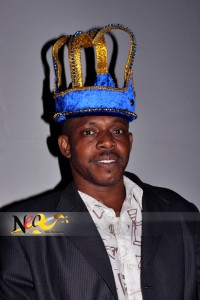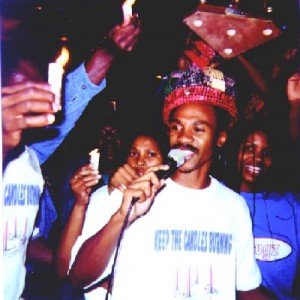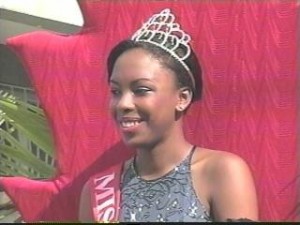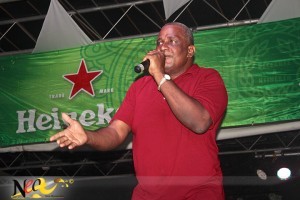
… Just as there was a battle in song between Hurricane and Scrunter, so there would be one between Brakes and Hunter—a man of high energy and diction speed. I experienced Hunter do “Carib Bacchanal” in 1998, and never in my days following calypso for sheer fun did I see such frenzy, tension, dance, screams, shouts, and dust.
Hunter appeared from a circle of Kalinago women wearing traditional Kalinago/Carib dress and jamming into song, drum, and wild refrain, asking such enigmatic, lyrically absurd questions as “how many grains of rice is in a pound” and receiving graceful rhythm in response in a line that said “banana pa ni l’argent encore” (there’s no longer money in banana, banana is no longer profitable, banana not making money again). We leave out the “is” or “are” in this case! The times were captured in simple lines like Spider did with Labor’s shoe and Demlabs hat.
Hunter went to a party in Kalinago/Carib territory where he met a “slim and sexy” who had an issue. This is where the song is set. This is social studies by way of calypso demographics.
Population: 2,300. Land space: 3,800 acres. Legal ownership issues. Food grown, consumed. Language: Kwéyòl, French, English, and some Kalinago greetings. Ancient name: Kalinago. Phonetics. Syntax. Female and male characteristics. Karina. Features, color of skin, eyes, hair, height, intro to genetics, rivers, belles. Orinoco, Venezuela, Karifuna, fishing techniques, boat making, felling tree techniques, herbs, medicines, worship. Children can dance too. It’s their stretch for the morning. A word or two from their dictionary! Vocabulary, mathematics, quantity, geography, civics, or is this dead? Hail Rosmund John!
In that party, the calypsonian met a Kalinago woman, probably sexy, yes, and a little more. She was conscious in the mode of a ’70s definition. Her people were sweet and loyal, yet were not being treated well by governments. She wanted him to carry her message in song.
Hunter won in 1998, presenting an ancient, latent cry, finding new lyrical codes, instrumentation, and effects of bouyon propagated in a fresh political space buzzing with businessmen and women eager to sell and buy Dominica’s anything from sand to stone. Workers?

The following year, in one of the most spectacular lighting scenes at Carnival City, Dominica Grammar School grounds, patrons lit five hundred candles in response to De Brakes calling on all to “Keep the Candles Burning”—a sacred calypso written by Pat Aaron. One year before 2000, the nation, its leaders, youth, farmers, in fact, the entire population needed light, needed truth. In the lyricist’s and performer’s judgment, the nation’s people had to keep that flame burning to realize cresting of a revolution in thinking and behavior at all levels of culture.
The observed violence Brakes sang about– that increase in the number of murders and suicides– mirrored in my view, years of accumulated stresses and unfreedoms, vicarious moments from foreign consumption and television played out, worked out, relived in a free-market copy space and thus random, frequent and shocking. Instructive. Competition, as Ency had noticed, was becoming hatred.
Kelly “Ghost” Williams sang “Let Us Pray,” and Ian “Black Starliner” Jackson called for a war to be waged against violence and crime. His props included graves and crosses. He began his rendition by recalling gruesome crimes of 1998. In 1999 Hunter sang “Anyting for a Dollar” while scrunter shouted “We Ain’t Voting Dem Again.”
It was in 1999 that Velda Wade walked on bois-bois in the Queen Pageant, the one when Ariel Williams wished all politicians would become one, the one in which Natasha Bellot came first runner-up, one when Catherine Irish of Marigot won Miss Photogenic. It was in that year that Syle Durand of Petite Soufriére stunned Carnival City with her flawless talent depicting failure of the West Indies team. “Imagine me, a woman, having to come to save West Indies.”

1999 carnival queen Vanessa Isles of Trafalgar, in her answer to the question—what would she wish for her country in the twenty-first century—hoped for a nation state free from violence and drugs where people respected each other. A Dominican, to the surprise of many, has a history of blunt social commentary in performance and calypso, and sometimes, it’s frighteningly prophetic!
Hunter restored his glorious position in 2000 among the stars to wear the crown again, singing a Patrick John composition titled “One Flag.” “One flag / one blood / one people / one nation” was the chant, one that would be repeated by Hunter in 2008 during the island’s year of reunion.
Streaks of light from a new millennium greeted calypso with a song written by the island’s first prime minister, again calling for unity. Hunter’s second song was titled “Dey Joking.” Brakes is recorded as having won second place and road march that year with his party theme song “Workers.” Smell and hear the fight? Brakes was hoping that Workers would’ve won the 2000 elections; at least his song heralded all the little things they were doing toupatou (everywhere)!

Freddy “Man Himself” Mendes said it nicely when he sang “de government breaking grong (ground),” “when you see dem done / there’ll be no more grong to stand on.”
In spite of its seeming ubiquitous activity, Workers did not win in the 2000 snap election, succumbing to the awesome appearance of Roosevelt Douglas. Yet De Brakes’s spirit was so fun loving, so calypsoic that on the night of the competition, he introduced a line and shoe-shaking dance, acknowledging a Dominica Labor Party victory, with Roosevelt Douglas watching, and the crowd went into a frenzy.
Hurricane came third and quit that year with two magnificent rhapsodies in “Wounded Lion” and “I Owe It All to You.” Strains of “Wounded Lion” come to memory now. I hear “in my valley of desolation do not cross me / don’t cross me.” This line is angry. The Valley of Desolation is Dominica’s geothermal, uninhabited region. Fumaroles. Ha-ha. It’s a very alone place, the kind whose immense fusion steam can transform a lover into a warrior in defense of resources and justice.

“My pride has been wounded / and I’m fighting back.” He noticed “not even foreigners taking advantage of we.” I gather he could’ve sung “even foreigners taking advantage of it”—that immense geothermal valley of desolation. He and his writers might not have visualized a Russian being chief financial officer at one time of West Indies Power Holdings company. And yet their Dominican soul from its exhale, suggested something emancipatory coming to an island that already had taken so much blows from selfish politicians.
They– Hurricane and his writer– painted this scenario in 2000, reminding me of my father’s idea of progressive degeneracy. “I feel like my life is heading for disaster / my demise is at the hands of my own kind / I know my progress could move on so much faster / but to each step I take / I fall two steps behind.” Hate in that state was overwhelming.
I felt this Dominica story to be my story in lyric and melody. In fact, given challenges entailed in Dominica’s development– natral disaster, rough, wild topography– it may well represent the perfect Dominica story.
Let us keep in mind, however, that our island’s victory unfurls in overcoming. We know pleasures in reaching plateaus.
Hurricane thanked that nation almost as if its travails and topographic alliances formed part of his and its unfolding. He sang plaintively in “I Owe It All to You” that he was giving back all his “triumphs and victories.”
True to his writer’s words, the calypso took off with the lines “there is no greater satisfaction / than living to serve your fellow-man.” This is a touching lyrical moment.
- Excerpt from Steinberg Henry’s “Calypso Drift (Segment 8, Chapter 66). calypsodrift.com, www.chapters.indigo.ca, www.amazon.com, www.alibris.co.uk and, Choices Bookstore —.

His writing style is so …odd.
Hmm…a difficult read, a form of writing very different from the Dominican lexicon. The writer does invoke some nostalgia but only when you can relate to the specific events from the past.